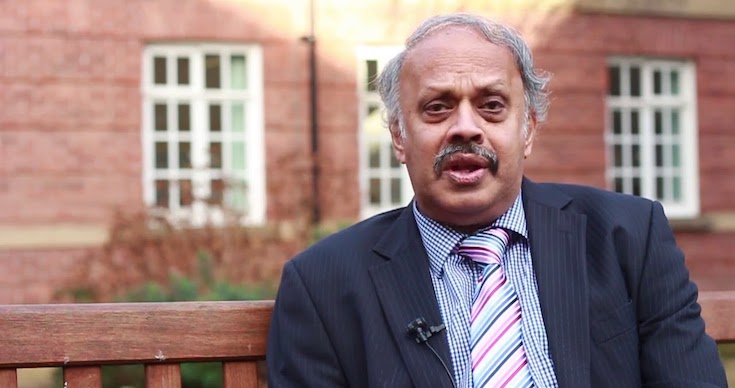Dr. Umesh Prabhu was a long way from his home in the small village of Palimar on India’s Arabian Sea coast when he arrived in the UK in 1982 with £300 in his pocket. Little did he know that he would become one of the best-known and most successful healthcare reformers in the country.
The son of a sari salesman, Prabhu had no plans to become a doctor. It was his older sister who wanted to go into medicine. But this was the 1960s, and even though she had been accepted by four universities, she wasn’t allowed to study medicine. Prabhu wanted to become an engineer, but his sister forged his signature on a medical school application. His destiny was sealed.
“She made me become a doctor,” says Prabhu. “Once I joined the medical college, I enjoyed it. Engineering actually was not my thing.”
Prabhu finished medical school in India but another barrier confronted the family. Because of the caste system, Prabhu was banned from doing postgraduate work. Luckily, he had a friend in the UK who suggested he continue his education and career there. Prabhu passed his exams on the first try, researched in Oxford, trained in Edinburgh and Leeds, and landed a job as a pediatrician at a hospital near Manchester.
It was there, after just four weeks on the job in 1992, that a tragedy forever changed the trajectory of his career and his life. It’s a story he’s told many times – in media interviews, at conferences, and to his colleagues and friends.
Two babies were born with the same name just a few days apart. One of them had a small mark that looked suspicious, and Prabhu ordered an X-ray to determine if it could have been caused by abuse or neglect. The X-ray came back normal and the baby was sent home. The problem was that the wrong baby was examined. Two days later, the baby with the mark was back in hospital with 26 rib fractures and head injuries. The baby survived but grew up with brain damage. The father was arrested and imprisoned.
“If we had taken the X-ray of the right baby, I would have seen the abuse and called a social worker,” said Prabhu, his memories and emotions still fresh from the incident 29 years ago.
Four weeks later, after more mistakes at the hospital led to another baby being harmed, Prabhu put systems in place to try to prevent future system failures.
“I developed an interest in why doctors make mistakes, why patients are harmed, and why people stay quiet if mistakes happen,” he said. “We set up good governance systems so anyone could come and talk to us if a patient came to harm. We created an open culture between doctors, junior doctors and nurses.”
Without actually planning it, Prabhu had set up a whistleblower-style reporting system. He called it “clinical governance.”
Over the next 20 years, Prabhu became a nationally recognized leader in healthcare reform and integrity, appearing in the media and consulted for his expertise. As the medical director of two hospital systems within the UK’s National Health Service, he helped reduce harm to patients by 90 percent within eight years. Through his “Happy Staff – Happy Patients” program, he turned around a hospital ranked among the lowest in staff satisfaction to the third-highest in the country.
“We were there to listen to the staff and to protect the patients,” he said. “We had to dismiss some bad doctors who were stealing drugs, committing sexual abuse, and diagnosing patients incorrectly.” One surgeon, he said, was responsible for the unnecessary deaths of 14 patients. “Everyone knew he was a bad surgeon, but no one did anything.” One patient died because staff confused two medications that look alike.
“We used to get all of these reports. I saw tragedy after tragedy. I realized that many were preventable. But I didn’t enjoy the job because the staff wanted to cover up their mistakes. Hospitals didn’t want to be sued, and doctors didn’t want to lose jobs.”
Another initiative Prabhu helped set up was 7 Steps of Patient Safety. “The staff started coming to see us in confidence. First, they had to trust us. We called it ‘compassionate courage.’”
Beyond disciplining doctors, he also helped save their careers if he could – including if they had alcohol or drug problems that could be treated successfully.
Prabhu went on to become a board member of the UK’s National Patient Safety Agency and helped start the National Reporting and Learning System, which tracks mistakes and poor care. He won several commendations, including a lifetime achievement award for patient safety from the University of Sheffield. He was invited to attend Queen Elizabeth’s 90th birthday celebration.
Prabhu retired in 2016, but he continues what he started. He went to India to help with “Earn, Learn and Return,” which recruits doctors to train in the UK and take their skills back home. He’s writing three books, Value-Based Leaders, 100 Dodgy Doctors, and 22 Angels, about children he says died needlessly.
“People are still calling me and contacting me through social media,” he says, including a couple in Northern Ireland whose daughter died in a medical facility 16 years ago. “The doctors made a mistake, and the family is still looking for justice.”
“Sometimes I feel helpless, doing this work from the outside now. I am just one person,” Prabhu reflects. “I have to do it for the patients. Tomorrow, I could be the patient, or you could be the patient.”
